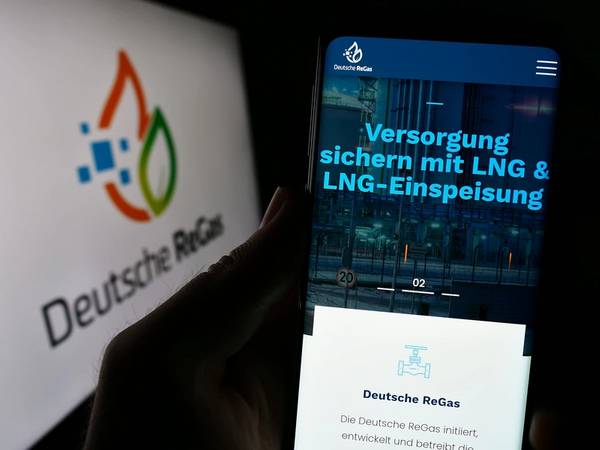
Germany is expanding its natural gas import options to replace Russian supply. Following are updates on key facilities and terminals being developed to host floating storage regasification units (FSRUs) to receive seaborne liquefied natural gas (LNG). Plans also include shore-based regasification terminals and facilities to import and produce ammonia and hydrogen.
STADE
State-owned Deutsche Energy Terminal (DET) has said in German media reports that FSRUs at both Stade and Wilhelmshaven 2 will start operations before the winter, without specifying precise commissioning dates. On June 28, developers at the Elbe river inland port of Stade formally inaugurated a land-based "ammonia ready" terminal for start in 2027, for which a final investment decision was taken by Hanseatic Energy Hub (HEH) in March. The FSRU Energos Force arrived on March 15 and is expected to operate until 2027, ahead of the onshore terminal starting operations. The onshore terminal, to be built by Spain's Tecnicas Reunidas TRE.MC, is expected to cost around 1 billion euros ($1.1 billion). HEH is backed by investment firm Partners Group, logistics group Buss, chemicals company Dow, and Spanish grid operator Enagas. A separate, Buss-led, consortium is nurturing plans for a 100 megawatt (MW) electrolysis plant, to be decided on in 2026, it said on Nov. 18.
WILHELMSHAVEN
Utility Uniper launched Germany's first FSRU operation, Wilhelmshaven 1, on the North Sea, in 2022. Uniper plans two green gas systems in the longer term: it will add a land-based ammonia import reception terminal and cracker in the second half of this decade to make green hydrogen. On Nov. 18, it said it had picked U.S. manufacturer Electric Hydrogen as supplier of a 200 MW electrolyser to be fed with local wind power. Another operator, Tree Energy Solutions (TES), plans to operate the second FSRU, Wilhelmshaven 2, from winter 2024, through to 2027, and plans to eventually convert its operations to clean gases.
BRUNSBUETTEL
The Brunsbuettel FSRU went into operation in April 2023 on the North Sea coast, initially chartered and operated by utility RWE's trading arm before it was handed over to DET at the start of 2024. It is the forerunner of a land-based LNG facility which has been cleared to receive 40 million euros of state support. It could start operations at the end of 2026, when a newly inaugurated, adjacent ammonia terminal could also start up. State bank KfW, Gasunie and RWE are stakeholders and Shell has committed to sizeable purchases.
MUKRAN
Mukran, on Ruegen island in the Baltic Sea, will supply onshore grids via pipeline firm Gascade's new OAL pipeline with LNG. Private company Deutsche ReGas started reloading services from the LNG tanker Coral Energy in September, using smaller tankers to deliver LNG to locations without pipeline access. This followed the opening of regular operations at the site with FSRUs Energos Power and Neptune. Gascade completed the 50 km (30 miles) infrastructure in February and feed-in is possible, with existing onshore pipelines NEL and EUGAL offering long-distance transport. ReGas holds long-term supply deals with France's TotalEnergies and trading group MET. The Mukran project has triggered local opposition, but legal challenges have been thrown out.
LUBMIN
ReGas and LNG-tanker operator Hoegh in June signed an agreement to develop the Baltic Sea port, a forerunner of Mukran, into an ammonia/hydrogen import terminal. On Oct. 14, the Federal Administrative Court backed Lubmin's operations, throwing out a case brought by environmental group DUH against its permit. Gascade has created a grid connection to the Eugal 1 and 2 onshore gas pipelines.
(Reuters)



